
 Livewell Dorset Home page link
Livewell Dorset Home page link
0800 840 1628 • Monday - Friday 9am - 6:30pm Contact Us
Being a healthy weight is good for our wellbeing, but losing weight too fast can be bad for our health. Learn how to lose weight safely and at a managable pace.
Being overweight or obese increases your risk of health problems such as:
You can reduce your risk of these conditions by managing your weight. Working towards a healthy weight can bring other benefits too, like feeling good about yourself and being a good influence on others.
Even a small weight loss can bring health benefits, particularly if you can maintain it.
Overweight and obesity are defined as having too much body fat. This is usually measured by Body Mass Index (BMI), which shows how heavy you are in relation to your height.
The BMI categories are shown below:

A BMI between 25 and 29.9 is classed as overweight and a BMI over 30 is classed as obese*.
To be a healthy weight, the amount of energy (calories) you take in needs to be balanced with the amount of energy you use up. We take in calories through food and drink and burn them through normal bodily functions and being active.
If you consume more energy than your body needs, the extra calories are stored as fat. This leads to weight gain over time. To lose weight, you need to burn more calories than you take in.
0.5-2lb a week is a safe, realistic weight-loss target. Making sensible changes to your diet and moving more are the best ways to achieve this.
Some fad diets claim they’ll help you lose weight very fast (think of plans that have people replacing meals with shakes). Losing weight too fast is not wise though, as your body has to break down muscle to do this. Muscle burns more calories than fat, so losing muscle means you’ll gain weight more easily later. Making small but maintainable changes to your lifestyle are much more likely to lead to lasting weight loss.
If you feel you need some guidance with your weight loss, register for your free healthy living profile contact our friendly team to find out how we can help. We can connect you with local services and offer 1:1 coaching to help you work through your challenges and build a healthy lifestyle that lasts.
*Note: though BMI is a useful measure of overweight/obesity, there are times when the numbers would be used with caution. It does not distinguish between fat and muscle, so someone who is very muscular would have a high BMI but may not have excess body fat. There are also some differences between ethnic groups: e.g. people of Asian origin have a higher risk of health problems at BMIs below 25.
Your search has returned 105 more results
View all results